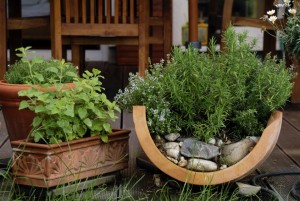Herbs are great additions to any meal – not only does it enhance flavor aroma, it can also add much-needed zing that will take your meal to a whole new level. To save yourself a trip from the grocery, grow your own herb garden. Here are a few tips to guide you.
 1. Herbs are highly adaptable. Aside from being very pleasing to look at, herbs can adapt in a variety of gardens. As long as they get the sunlight they crave, they can survive anywhere. An exception to this rule however are mints, which you should keep under partial shade.
1. Herbs are highly adaptable. Aside from being very pleasing to look at, herbs can adapt in a variety of gardens. As long as they get the sunlight they crave, they can survive anywhere. An exception to this rule however are mints, which you should keep under partial shade.
2. Plant herbs in problem areas. According to experts, herbs are known to thrive where most perennials fail. In addition, you don’t need to spend on plant food to keep them thriving – they’ll survive well without it.
3. Herbs prefer sweet soil. Although herbs like plenty of sun and can thrive in problem areas, their preferred type of soil is sweet and not at all acidic. You can treat the planting bed with lime to help it transform into more favorable conditions.
4. Take note of the climate. Some herbs fare well in the winter better than others. These hardy herbs include oregano, cooking sage, winter savory, English lavender, peppermint, tarragon, lemon balm, lovage, and spearmint. Herbs that prefer warmer temperatures include sweet bay, parsley, summer savory, sweet basil, rosemary, stevia, and knotted marjoram.
5. Keep the herbs in one area. It will look much better if you plant your herbs in one area of the garden. Better yet, devote your entire outdoor space to herbs. Not only will your garden look particularly dashing, it will smell amazing as well. If you already have an existing garden, you can sprinkle some herbs into vegetable gardens and let them cohabitate.
6. Take your garden a few steps from the kitchen. If you’re in love with cooking and would like your favorite fresh herbs within reach, consider planting herbs in containers and placing them just a few steps away from your kitchen door. You can also place these containers on the table or the counter top – perfect for when you need some freshly plucked tarragon in your pasta.
Plenty of herbs fare well in pots. Candidates include marjoram, oregano, thyme, rosemary, and sage. Just be sure to pick a container with the right depth.
For more tips on how to grow your own herb garden, check out this article by Westchester Magazine. As for other DIY home projects, our blog has plenty of suggestions.





